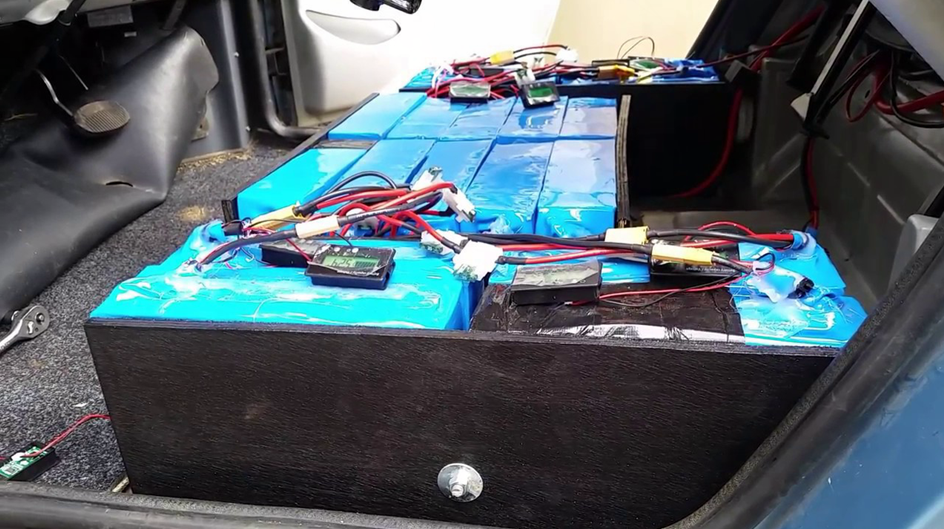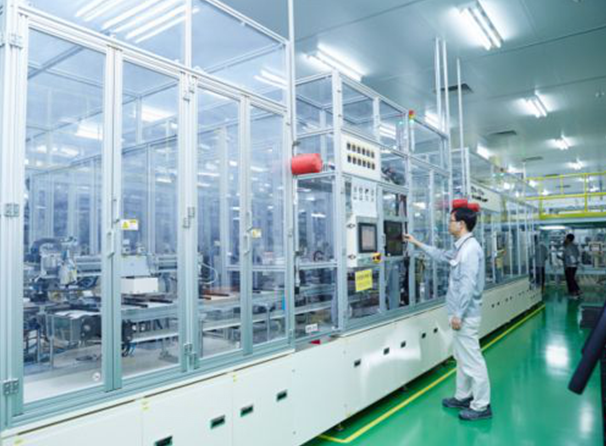Lithium-ion Battery: The Core Technology of Modern Energy Storage
Lithium-ion battery, as one of the core technologies in the field of modern energy storage, has been attracting attention since its birth with its excellent performance and wide application prospects. This article will deeply explore the basic principles, structural composition and unique advantages of lithium-ion batteries in energy storage, and reveal the secrets of this technological product to you.
1. Basic Principles
Li-ion battery is a secondary battery, that is, a rechargeable battery, and its working principle mainly depends on the movement of lithium ions between the positive electrode and the negative electrode. During the charging process, lithium ions are deintercalated from the positive electrode material and embedded into the negative electrode material through the electrolyte, making the negative electrode in a lithium-rich state; while during the discharging process, lithium ions are deintercalated from the negative electrode material and returned to the positive electrode through the electrolyte to complete a complete charging and discharging cycle. This process is commonly referred to as the “rocking chair battery” effect.

2. Structural Composition
The structure of Li-ion battery is relatively complex, but it mainly consists of the following main parts:
Positive electrode: The positive electrode is an important component of lithium-ion batteries, and usually uses lithium-containing oxides as active materials, such as lithium cobalt oxide (LixCoO2). The choice of positive electrode material directly affects the performance of the battery, including energy density, cycle life, etc.
Negative electrode: The negative electrode usually uses carbon materials such as graphite or petroleum coke as active materials. These materials have good lithium insertion properties and can receive lithium ions that migrate from the positive electrode during charging.
Electrolyte: The electrolyte is the channel for lithium ion migration in Li-ion batteries, usually a solution of organic solvents and lithium salts. The performance of the electrolyte directly affects the ionic conductivity and safety of the battery.
Diaphragm: The diaphragm is located between the positive and negative electrodes to prevent short circuits caused by direct contact between the two electrodes. The diaphragm also allows lithium ions to pass through to complete the charge and discharge process.
Battery case: The battery case is used to encapsulate all of the components inside the battery and protect the battery from the external environment. Common battery case materials include steel cases and aluminum cases.

3. Unique Advantages
The reason why lithium-ion batteries can occupy an important position in the field of energy storage is mainly due to the following unique advantages:
High energy density: Lithium-ion batteries have high energy density and can store a large amount of electrical energy in a small volume, which is particularly important for applications such as portable electronic devices and electric vehicles.
Long cycle life: Lithium-ion batteries have a long cycle life and can maintain a high level of performance after multiple charge and discharge cycles, reducing the cost of ownership.
No memory effect: Compared to early nickel-cadmium batteries and nickel-metal hydride batteries, lithium-ion batteries have the characteristics of no memory effect, that is, the battery capacity does not decrease due to partial discharge.
Low self-discharge rate: Lithium-ion batteries have a low self-discharge rate and can maintain a high power level when not used for a long time.
Environmentally friendly: Lithium-ion batteries do not contain harmful substances such as heavy metals and have a low impact on the environment. At the same time, with the advancement of recycling technology, the recycling rate of lithium-ion batteries is also increasing.
In summary, lithium-ion batteries have become one of the core technologies in the field of modern energy storage with excellent performance and wide application prospects. Through continuous technological innovation and process improvement, the performance of lithium-ion batteries will be further enhanced, providing more convenient and efficient energy solutions for people’s daily lives and industrial production.
-
 Введение: В современном быстро меняющемся мире портативные электронные устройства стали неотъемлемой частью нашей повседневной жизни. От смартфонов до ноутбуков — эти устройства произвели революцию в том, как мы общаемся, работаем и развлекаемся. Одним из важнейших компонентов, который способствовал этой революции, является литиевая батарея. Благодаря высокой плотности энергии и длительному сроку службы литиевые батареи стали предпочтительными...Читать далее
Введение: В современном быстро меняющемся мире портативные электронные устройства стали неотъемлемой частью нашей повседневной жизни. От смартфонов до ноутбуков — эти устройства произвели революцию в том, как мы общаемся, работаем и развлекаемся. Одним из важнейших компонентов, который способствовал этой революции, является литиевая батарея. Благодаря высокой плотности энергии и длительному сроку службы литиевые батареи стали предпочтительными...Читать далее -
 Introduction: In recent years, the healthcare industry has witnessed significant advancements in technology, leading to improved patient care and better treatment outcomes. One such technological breakthrough that has revolutionized healthcare is the development of medical device lithium batteries. These batteries have transformed the capabilities of medical devices, making them more efficient, portable, and reliable. This article explores the impact of...Читать далее
Introduction: In recent years, the healthcare industry has witnessed significant advancements in technology, leading to improved patient care and better treatment outcomes. One such technological breakthrough that has revolutionized healthcare is the development of medical device lithium batteries. These batteries have transformed the capabilities of medical devices, making them more efficient, portable, and reliable. This article explores the impact of...Читать далее -
 Introduction A locomotive is a powerful engine used for transporting goods and passengers across long distances. The locomotive starter battery is an essential component of the locomotive engine that plays a vital role in powering up the engine. This article explores the importance of a locomotive starter battery and its significance in ensuring efficient and reliable locomotive operation. What...Читать далее
Introduction A locomotive is a powerful engine used for transporting goods and passengers across long distances. The locomotive starter battery is an essential component of the locomotive engine that plays a vital role in powering up the engine. This article explores the importance of a locomotive starter battery and its significance in ensuring efficient and reliable locomotive operation. What...Читать далее -
 Введение Для владельцев лодок и любителей нет ничего более неприятного, чем оказаться посреди озера или океана из-за неисправного аккумулятора. Судовой пусковой аккумулятор играет решающую роль в обеспечении плавного запуска вашей лодки. Он обеспечивает необходимую мощность для запуска двигателя, управления освещением и питания других электронных устройств...Читать далее
Введение Для владельцев лодок и любителей нет ничего более неприятного, чем оказаться посреди озера или океана из-за неисправного аккумулятора. Судовой пусковой аккумулятор играет решающую роль в обеспечении плавного запуска вашей лодки. Он обеспечивает необходимую мощность для запуска двигателя, управления освещением и питания других электронных устройств...Читать далее -
 Введение В последние годы растет интерес к использованию технологии литий-железо-фосфатных аккумуляторов (LiFePO4) в качестве альтернативы традиционным свинцово-кислотным батареям. Это связано со многими преимуществами, которые предлагают батареи LiFePO4, включая улучшенную плотность энергии, более длительный срок службы и более экологичный дизайн. В этой статье мы рассмотрим преимущества технологии аккумуляторов LiFePO4...Читать далее
Введение В последние годы растет интерес к использованию технологии литий-железо-фосфатных аккумуляторов (LiFePO4) в качестве альтернативы традиционным свинцово-кислотным батареям. Это связано со многими преимуществами, которые предлагают батареи LiFePO4, включая улучшенную плотность энергии, более длительный срок службы и более экологичный дизайн. В этой статье мы рассмотрим преимущества технологии аккумуляторов LiFePO4...Читать далее -
 Введение: В последние годы базовые станции связи стали неотъемлемой частью нашей повседневной жизни. Эти станции отвечают за передачу и прием сигналов для различных сетей связи, включая мобильные телефоны, телевидение и интернет-услуги. Чтобы обеспечить бесперебойную и надежную связь, важно иметь надежную систему резервного питания. Литиевые батареи появились как...Читать далее
Введение: В последние годы базовые станции связи стали неотъемлемой частью нашей повседневной жизни. Эти станции отвечают за передачу и прием сигналов для различных сетей связи, включая мобильные телефоны, телевидение и интернет-услуги. Чтобы обеспечить бесперебойную и надежную связь, важно иметь надежную систему резервного питания. Литиевые батареи появились как...Читать далее -
 The automotive industry has seen significant advancements in technology over the years. The introduction of lithium-ion batteries has revolutionized the way we power our cars. The lithium starter battery has become increasingly popular due to its many benefits over traditional lead-acid batteries. In this article, we will explore the advantages of lithium starter batteries and how they are changing the...Читать далее
The automotive industry has seen significant advancements in technology over the years. The introduction of lithium-ion batteries has revolutionized the way we power our cars. The lithium starter battery has become increasingly popular due to its many benefits over traditional lead-acid batteries. In this article, we will explore the advantages of lithium starter batteries and how they are changing the...Читать далее

